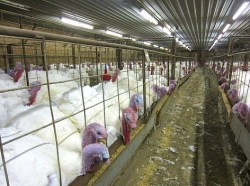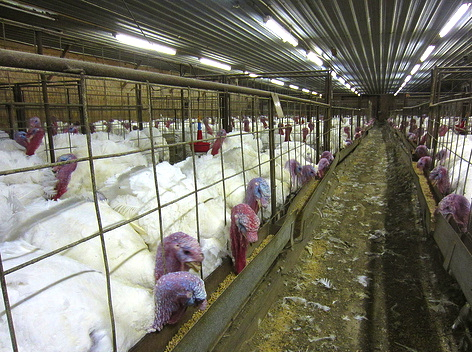
The Butterball facility in North Carolina that was raided on Thursday. (Photo by Mercy for Animals.)
If turkey were beer, Butterball would have the brand power of Budweiser, Miller, and Coors combined. From six plants, the company produces 1 billion pounds of turkey each year and exports the meat to over 50 countries.
Given this dominance, the Butterball brand has been a priceless asset to the company — until Thursday morning. At about 9:00 a.m., officers from the local sheriff’s office raided a Butterball semen collection facility in Shannon, N.C. (Industrially bred Broad-Breasted White turkeys must be artificially inseminated to reproduce.) The raid has not yet produced confirmed arrests, but if the events of the past year are any guide, the police action could mark a turning point in Butterball’s history.
The raid occurred in response to an undercover investigation by the nonprofit animal advocacy group Mercy For Animals (MFA) that took place over the past two months. The group posted this graphic video on YouTube just minutes after the raid began. The video shows turkeys being kicked, beaten with a metal rod, dragged by their necks, and thrown violently into cages.
Although MFA is well known for urging its audience to adopt a vegan diet, one doesn’t have to be vegan — or even plan to become one — to find this type of footage disturbing. And yet, because there’s no shortage of such images, it’s easy to wonder: Will the release of this video — and the subsequent raid — make any real difference in the long term?
If Butterball operates from the standard industry playbook, its next steps are somewhat predictable: They’ll blame low-level employees, and profess that the cruelties documented by today’s video are not representative of the company’s animal welfare standards. In fact, in response to today’s events, the company has already issued a PR statement [full version, sub required, excerpt here] that reads fairly typically:
Butterball has a zero tolerance policy for any mistreatment of our birds or the failure to immediately report mistreatment of our birds by any associates. We are performing extensive internal and third-party audits as part of our own investigation. Employees found in violation of Butterball’s animal welfare policies will be subject to immediate termination.
Whether the abuse and mistreatment captured is part of a systematic devaluing of both workers and animals isn’t immediately clear from one video, but it’s unlikely that the cramped, dark, ammonia-filled turkey operation shown here is unique. (In their statement, for instance, the company admits to having six veterinarians for all their facilities; that’s only six people overseeing the health of a billion pounds of turkey a year!) And, as this story unfolds, Butterball’s lawyers will be pressed to provide more specifics about the “extensive internal and third-party audits” the company promises to conduct.
This is not the first such undercover operation by MFA. In fact, the group has conducted 10 other similar investigations over the past three years. And, regardless of whether the investigations centered on pigs or cows or chickens, time after time the response from management has been to evade responsibility.
In the past year alone, Sparboe and Iowa Select Farms blamed low-level employees for cruelties exposed in similar undercover videos. And, when employees of the E6 Cattle Company were caught on tape shattering the skulls of live calves with pick axes, the company owner denied giving the orders.
We’re likely to see Butterball choose a similar path. But if the recent past is any example, it’s also possible that the government will get involved — something that has a way of happening after high-profile cruelty investigations. In 2008, for example, an Humane Society cruelty investigation at the Westland/Hallmark slaughterhouse led to the largest beef recall in history. The litigation and other massive expenses associated with this recall bankrupted the company.
Or look at what happened to Jack DeCoster’s egg empire, which was the subject of another 2009 undercover investigation by MFA. Following the investigation, unsanitary conditions at other DeCoster egg farms led to the recall of over half a billion eggs. DeCoster has since left the egg business.
Evasive PR hasn’t worked for other companies, and it’s even less likely to work for Butterball, whose strong brand name makes the company uniquely vulnerable to having its distribution choked off by retailers. This year, several top supermarket chains have terminated their relationships with companies at the center of undercover cruelty investigations. Safeway, McDonald’s, Sam’s Club, Kroger, Costco, and Target all cut ties in 2011 with companies that were featured in Mercy For Animals undercover videos.
Butterball now faces a daunting moment in its history. If the fallout from this investigation receives enough media attention, the turkey giant may just have to reinvent itself as a company that takes animal welfare seriously.




